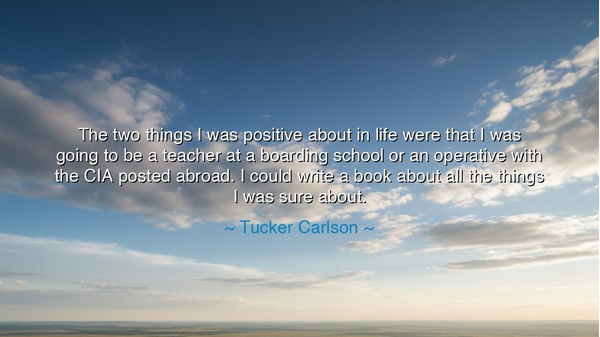
The two things I was positive about in life were that I was
The two things I was positive about in life were that I was going to be a teacher at a boarding school or an operative with the CIA posted abroad. I could write a book about all the things I was sure about.






Tucker Carlson once reflected on the uncertainties of his own path with these words: “The two things I was positive about in life were that I was going to be a teacher at a boarding school or an operative with the CIA posted abroad. I could write a book about all the things I was sure about.” At first, it may strike the listener as humorous — a confession of mistaken certainties — but within it lies the ancient lesson of human expectation and divine redirection. What we imagine to be fixed often dissolves, and what we are sure of often gives way to what life itself has chosen for us.
The origin of this reflection comes from the clash between youthful certainty and the unpredictable unfolding of destiny. Carlson names two paths — the quiet, scholarly discipline of the teacher, and the shadowed, dangerous calling of the operative abroad. Both are noble, both demanding in their own way, but neither became his final road. His words reveal the irony known to all who live long enough: that our strongest convictions in youth are often overthrown by time. We plan, we declare, we are certain — and yet the wheel of life spins otherwise.
History is rich with such ironies. Consider Christopher Columbus, who was certain he had reached the Indies when in truth he had stumbled upon a new world. His certainty did not align with reality, yet his mistaken voyage altered history. Or think of Charles Darwin, who once studied theology, convinced that he would live a quiet life as a clergyman. Yet it was not the pulpit but the voyage of the Beagle that set him upon his true course. Like Carlson, they could have written volumes on what they were sure about, and how life corrected them with a firm but guiding hand.
The heart of Carlson’s words is this: human beings cling to certainty as though it were armor, but the truth is that much of life is beyond foresight. To imagine one’s fate is natural; to believe it is immovable is folly. The student may think he knows what his future holds, yet the twists of time, chance, and opportunity will surprise him. The lesson is not to despair at this, but to embrace it. For if we were bound only to our first imaginings, we might never discover the greater roads awaiting us.
Yet the two imagined paths — teacher and operative — reveal something deeper. Both roles, in their essence, are about influence and impact. The teacher shapes minds, the operative shapes events; both labor in service beyond themselves. Even in the irony of unrealized certainty, there is truth: Carlson’s heart leaned toward paths of action and consequence, and though his course shifted to another realm — journalism, commentary, and influence through words — the spirit of his early convictions remained. This is the secret hidden in his jest: what we think is mistaken often contains the seed of what proves true.
The lesson for us is clear: do not fear when your certainties collapse. It is not failure; it is transformation. Life will strip away false expectations, not to leave you empty, but to reveal your true work. And even when your predictions prove wrong, they may still point to the deeper desires within you — desires that will manifest in unexpected forms.
What must you do, then? First, dream boldly, but hold your dreams with open hands. Second, when the path changes, do not lament that you were “wrong”; instead, ask what hidden truth in your early conviction still guides your heart. Third, live with humility, remembering that certainty is a fragile garment, but adaptability is armor forged for the long journey.
Thus, let Carlson’s words echo in your mind: “I could write a book about all the things I was sure about.” Let it remind you that life delights in overturning our plans, but also in leading us to roads more fitting than we ever dared imagine. Do not cling too tightly to your breezes of certainty, but walk steadily, ready to be surprised by the winds of destiny. For in the end, it is not our certainties that shape us, but the journeys we never foresaw.






AAdministratorAdministrator
Welcome, honored guests. Please leave a comment, we will respond soon